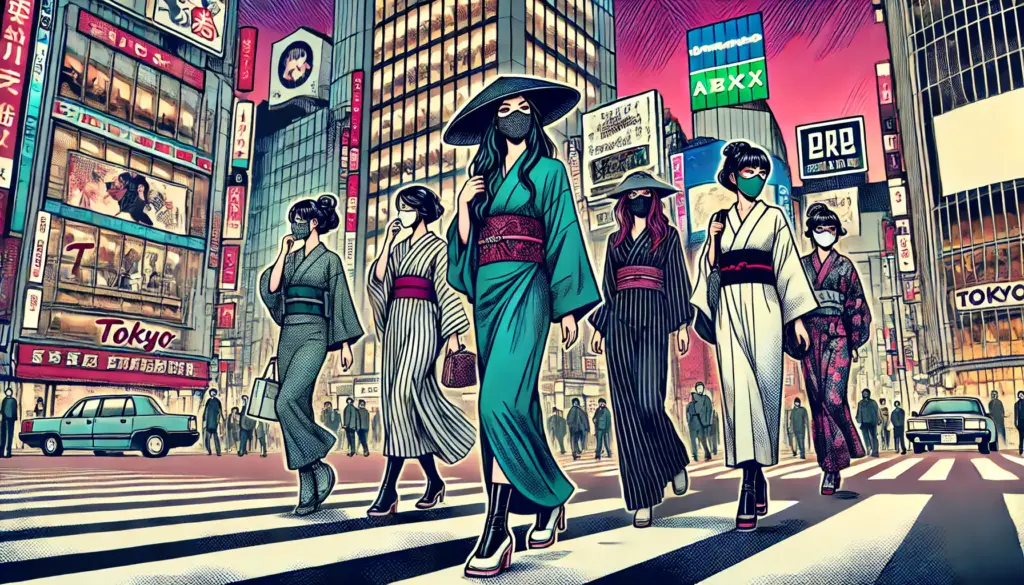
🧏♀️ This is not just about beauty—it’s about belonging.
In Japan, many women feel compelled to put on a full face of makeup before stepping outside—even for something as simple as a trip to the corner store. This daily ritual isn’t driven solely by aesthetic choice. Instead, it’s deeply rooted in cultural expectations, social conformity, and internalized shame.
Could it be that makeup in Japan functions like a modern, invisible version of the burqa—a symbol not of religious modesty, but of societal compliance?
Let’s dive deeper into the unique blend of social psychology, workplace norms, and historical gender roles that underpin this phenomenon.
💄 Makeup as a Social Duty, Not a Personal Choice
In Japan, the expectation to wear makeup is not always stated—but it’s always present.
Unlike in some Western cultures, where wearing makeup is seen as optional or expressive, in Japan, it’s often treated as a sign of maturity, discipline, and respect. A bare face in public can trigger reactions ranging from surprise to disapproval.
Many women report feeling “naked,” “rude,” or “unprofessional” when seen without makeup. This sentiment is particularly strong in professional or formal contexts—job interviews, client meetings, weddings, and even university orientations.
According to a 2024 survey by a major Japanese cosmetics brand, over 78% of Japanese women between the ages of 20 and 45 said they feel “anxious” or “ashamed” going out barefaced.
This isn’t vanity—it’s a psychological reflex conditioned by society.
🧠 The Role of “Shame” in Japanese Culture
Japan is often described as a shame-based society. Where Western moral systems focus on individual guilt (“I did something wrong”), Japan emphasizes social perception (“People will think I did something wrong”).
Makeup, in this context, becomes more than enhancement—it’s a defensive mechanism against judgment.
There’s even a common phrase:
「化粧をしないと失礼」
Not wearing makeup is disrespectful.
To the modern Western ear, this may sound extreme. But in a collectivist culture where harmony is prized, fitting in often outweighs standing out. A face without makeup becomes not a canvas—but a transgression.
🧕 The Invisible Burqa: A Comparison Worth Exploring
The comparison between makeup in Japan and the burqa in conservative Islamic societies may seem provocative—but it’s not about religion. It’s about invisible enforcement.
| Burqa | Makeup in Japan |
|---|---|
| Symbol of modesty and piety | Symbol of professionalism and self-respect |
| Enforced through religious and social norms | Enforced through workplace, peer, and media norms |
| Non-compliance leads to stigma or punishment | Non-compliance leads to ridicule or career penalties |
Neither is universally chosen—many women wear them not because they want to, but because they feel they must.
👩💼 The Corporate Face: A “Mandatory Minimum”
Japanese offices still reinforce rigid gender expectations. While men may be expected to wear suits and ties, women face an additional expectation: makeup.
Unspoken rules often dictate:
- Foundation to even skin tone
- Blush to signal “health”
- Eyeliner and mascara to show “alertness”
- Lipstick to express “readiness”
These are not merely cosmetic—they’re treated as indicators of emotional state and competence.
In fact, women have reported being:
- Advised during job interviews to wear more makeup
- Reprimanded by managers for looking “tired” (i.e., not wearing enough concealer)
- Criticized by colleagues for “not putting in effort”
For many, makeup is part of the corporate uniform—unspoken, yet strictly enforced.
📺 Media, Influencers, and the Myth of “Natural Beauty”
Ironically, the Japanese media is filled with messages about embracing “natural” beauty—but what they really mean is the illusion of natural beauty.
TV ads and magazines often promote:
“No-makeup makeup”
“Skin-first beauty”
“Look effortlessly flawless”
The paradox? These looks still require multiple products and techniques, just applied subtly. The goal is not to be yourself—but to look like you’re effortlessly conforming.
🌱 Cracks in the Foundation: Younger Generations Speak Out
There is a slow but visible shift happening—especially among Gen Z women in urban areas like Tokyo and Osaka.
Some of these changes include:
- #ノーメイクチャレンジ (“#NoMakeupChallenge”) trending on Japanese TikTok
- Beauty YouTubers revealing their skincare-only routines
- Young women rejecting “office makeup” expectations in creative industries
But while this wave of resistance is growing, it remains a minority position. Outside big cities, and in traditional companies, old norms still dominate.
🧘♀️ Makeup Should Be Freedom, Not Obligation
The root of the problem isn’t makeup itself. It’s the loss of autonomy—when something personal becomes required.
In a truly free society, women should be able to:
- Wear makeup without being called vain
- Skip makeup without being called lazy
- Choose for themselves, not for approval
Japan is a nation that treasures harmony, but true harmony must include the freedom to opt out.
Until then, for many Japanese women, the daily makeup routine remains a silent ritual of submission—performed not for self-love, but to avoid shame.
💡 Final Thought:
Makeup can be empowering—but only when it’s a choice, not a chore.



















































